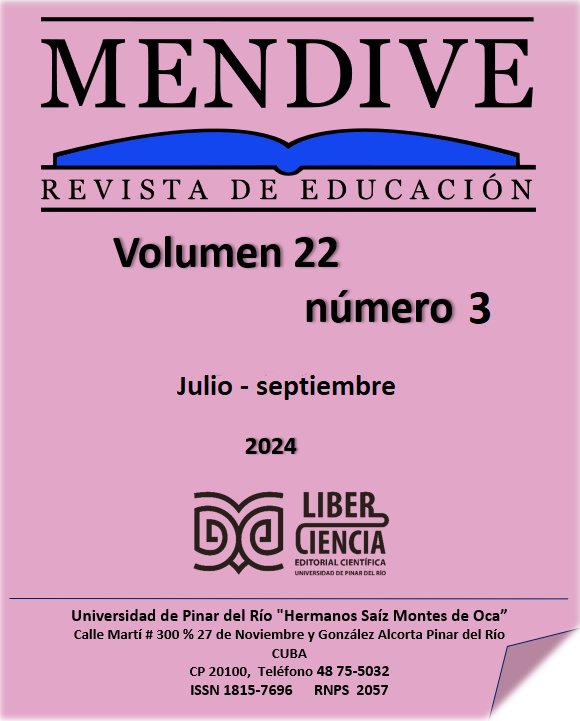School leadership workshop for high school students
Main Article Content
Abstract
In the current context, the demand for leaders capable of guiding communities towards improvement and the achievement of shared objectives is increasingly evident. Therefore, the objective of the article is to present the results obtained in a school leadership workshop with high school students from a district of Lima, Peru. An applied quantitative approach was adopted, with an explanatory and quasi-experimental research design, with an experimental group and a control group. Likewise, the instrument was a questionnaire validated by experts and subjected to Cronbach's alpha test. Data collection was carried out through a sample of high school students belonging to an educational institution located in a district of Lima. The results of the study showed that, after applying the educational workshop, there were positive changes in the development of school leadership in the experimental group, unlike the control group that did not show variations. Specifically, an improvement was observed in the dimensions of charisma, individualized consideration and contingent reward. Likewise, the percentage of low levels in these dimensions decreased and the percentage of medium and high levels increased. These results allowed us to conclude that the educational workshop “A challenge for you” had a significant impact on the development of school leadership in high school students in a district of Lima, Peru, since the holistic training approach used during the intervention allowed for changes that were reflected in a greater strengthening of school leadership in the participants.
Downloads
Article Details

This work is licensed under a Creative Commons Attribution-NonCommercial 4.0 International License.
References
Barraza, L. (2015). Gestión y liderazgo escolar. Red Durango de Investigadores Educativos A.
Burgos. (2015). Talleres educativos en Atapuerca. Universidad de Burgos. http://www.upd.edu.mx/PDF/Libros/Tomo7.pdf
Cifuentes, J., González, J. y González, A. (2020). Efectos del liderazgo escolar en el aprendizaje. Revista Artículos de investigación científica y tecnológica, 14 (26), 78-93. https://doi.org/10.15765/pnrm.v14i26.1482
Fiedler, F. (1971). The contingency model and the dynamics of the leadership process. Advances in experimental social psychology, 11, 59-112. https://doi.org/10.1016/S0065-2601(08)60005-2
Guarnier, K. y Chimenti, P. (2023). Advancing in the neuroleadership field: a systematic and integrative review. Cadernos Ebape.Br., 21 (6), 1-30. https://doi.org/10.1590/1679-395120220184x
Hersey, P. y Blanchard, K. (1969). Management of organizational behavior. Englewood Cliffs. Prentice Hall. https://www.kenblanchardbooks.com/wp-content/uploads/2017/08/Management-of-Organizational-Behavior-Read-Sample0001.pdf
Hiatt, M. (1996). Meaningful differences in the everyday experience of young American children. Paul H. Brookes.
Kelly, G. (1955). La teoría de los constructos personales. Kaisa Puhakka.
McIntyre Miller, W. y Abdou, A. (2018). Cultivating a Professional Culture of Peace and Inclusion: Conceptualizing Practical Applications of Peace Leadership in Schools. Front. Educ. 3(56), 1-20. https://doi.org/10.3389/feduc.2018.00056
Navarro-Corona, C. (2016). Consideraciones teóricas sobre el concepto de liderazgo y su aplicación en la investigación educativa. Revista Electrónica Educare, 20(2), 1-20. https://doi.org/10.15359/ree.20-2.5
Pont, B., Nusche, D. y Moorman, H. (2019). Improving School Leadership, Volume 1: Practice and Policy. OCDE Publishing. https://www.oecd.org/education/school/44374937.pdf
SiseVe. (2020). Instructivo Siseve 2020. Perú: Unidad de Gestión Educativa Local Puno. http://ugelpuno.edu.pe
Tafur, R., Espinoza, H. y Tejada, N. (2020). El liderazgo pedagógico del director y el aprendizaje de los estudiantes: percepciones de directores y docentes de dos instituciones educativas de Lima, Perú. Revista Semestral de la Red de Apoyo a la Gestión Educativa de Uruguay, 11, 8-19. Perú. https://files.pucp.education/departamento/educacion.pdf


